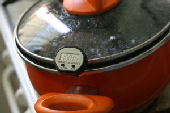
Purpose
To study the effect of adding solutes on the boiling point of water.
Additional information
Instead of boiling pure liquid water, if we add a solute to it, the resulting solution behaves differently when heated. The molecules in a liquid solution are less organized as compared to those in pure water; this is because the solute molecules or ions are free to move about randomly. As a result, the water molecules are more disorderly in a solution as compared to pure water.
The boiling point of a solution of sugar in water, under a given pressure, increases with the concentration of the solution. Also, decreasing purity increases the boiling point of the solution. It has been proven that the same conclusion may be extended to most solvents as well.
It is also interesting to note that the addition of a solute to a solvent also has an effect on the freezing point of the solvent – it lowers the freezing point of the solvent.
Sponsored Links
Required materials
- Round-bottomed flask
- Double holed cork
- Stand with holder for round-bottom flask
- Thermometer
- Open ended glass tube
- Sugar
- Bunsen burner
- Wire gauze
Estimated Experiment Time
Approximately 10 minutes to set up the apparatus and 20 minutes to conduct the experiment.
Step-By-Step Procedure
- 1. Take approximately 50 cc. of water in the round-bottomed flask.
- 2. Heat the flask.
- 3. Note the temperature at which the water begins to boil.
- 4. Take ten readings in all (every thirty seconds for five minutes) and take the average to find the boiling point.
- 5. Now add about 15 gm. of sugar to the water and repeat the experiment.
Note
You can repeat the experiment with several different substances as solutes.
Observation
The sugar solution boils at a higher temperature than water (without any solute dissolved in it).
Result
The addition of a solute to water increases its boiling point.
Sponsored Links
Take a moment to visit our table of Periodic Elements page where you can get an in-depth view of all the elements,
complete with the industry first side-by-side element comparisons!